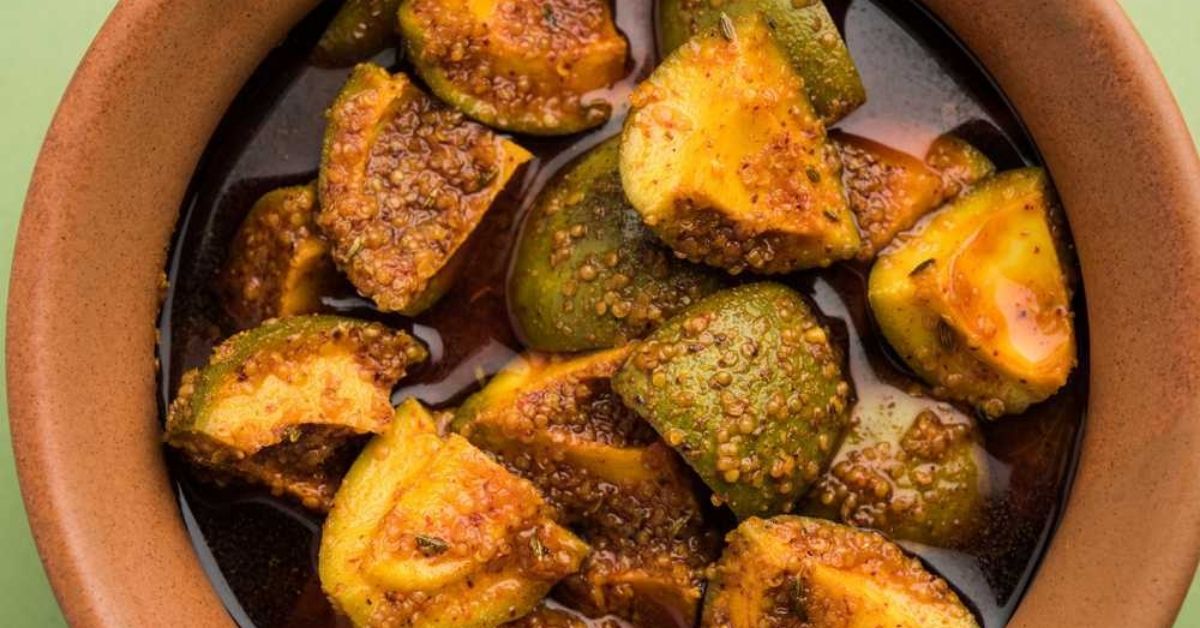Dadi’s Homemade Pickle Is Better For Your Gut Than Artificial Probiotics. Here’s Why
Love homemade achaar but worried about intaking excess salt? Science says traditional Indian pickles are more than just refreshing treat and can do wonders for your digestion.

In South India it is common to finish any meal with a bowl of curd rice and a spoonful of spicy pickle. While many of us thought this was a refreshing treat at the end of a meal, science says there’s more to it.
Known as achaar in Hindi and urugai in Tamil, pickles are made using a variety of vegetables like lemon, raw mango or bitter gourd and sometimes even fruits. Pickling is one the oldest culinary traditions followed to preserve food. According to reports, food was pickled to stay edible during long journeys across seas.
The process originated in India around BCE 2030 when native cucumbers from Tigris valley, Kerala, were being shipped across the world. Reports say that the Roman emperor Julius Caesar fed them to his troops to increase their physical strength. Even the Greek philosopher Aristotle has praised the healing benefits of pickled cucumbers.
Our dadis also followed the same practice by using naturally available resources like salt, sunlight and spices to ensure seasonal produce does not go to waste. In the process, they also enhanced their taste and nutritional value.
A Healthy Hint of Spice
Pickling involves preserving food in high acid concentrations, enabling its lifespan over one year without refrigeration. It begins with drying the vegetable or fruit under direct sunlight before being cured with salt, oil and spices. The mixture is sealed in an airtight container and left in a space that receives ambient light.
Once the fermentation process starts, the mix produces an acid. This prevents the growth of pathogenic bacteria that could cause the pickle to go rancid. Within 15 days to one month, the pickle will be ready for consumption.
Adding a spoonful of pickle to your meal not only enhances taste but also eases the digestive process.
According to scientific reports, the fermentation process produces healthy bacteria in the pickle known as probiotics. This is known to aid digestion as well as improve gut health by making them tolerant of bad bacteria and pathogens. The probiotics lower the pH level in the colon, which helps the stool to move faster.
Moreover, the natural probiotics available in pickles can renew, restore and grow affected tissue linings in the digestive tract. It neutralises harmful microorganisms and replaces them with beneficial live ones. This also gives a boost to the immune system.
Though artificial probiotics are available in the market, they may not be efficient. These are live microorganisms which can lose their viability when there is damage to the packaging or during its storage. However, homemade pickles have natural probiotics.
Science also says that pickles are a rich source of protein, dietary fibres, vitamins, antioxidants and more. The benefits also differ depending on the types of spices used to cure the vegetables. Some pickles contain spices like turmeric, which is antibacterial. Others contain mustard seeds, which is a rich source of omega 3. Garlic pickle is believed to lower cholesterol.
While there are several pickle choices available in the market, a homemade pickle ensures the use of organic ingredients, locally sourced cold-pressed oil and other healthy ingredients.
Here’s a recipe for a healthy homemade pickle:
Ingredients
250 g fresh turmeric
250 g fresh ginger
250 g fresh garlic
250 g fresh green chillies
Juice from 3 lemons
1 teaspoon asafoetida
3 tablespoons of mustard seeds
1 teaspoon fenugreek seeds
1 tablespoon red chilly powder
5 tablespoons of mustard oil
1 tablespoon fennel seeds
1 teaspoon black pepper powder
Salt as per taste
Method
Step 1: Scrape the outer layer of turmeric and ginger, and rinse it well.
Step 2: Wash chillies and peel the garlic.
Step 3: Finely chop them — julienne style.
Step 4: Add mustard oil in a pan and heat it well.
Step 5: Switch off the flame and quickly add asafoetida and fenugreek seeds.
Step 6: To this add the finely chopped vegetables.
Step 7: Add chilli powder, pepper, and fennel seeds and mix well.
Step 8: Finally, add lemon juice and store in an airtight container.
Step 9: After six hours have passed give the pickle a good mix in the jar.
Step 10: Leave the jar in a well-lit area for a few days.
(Edited by Yoshita Rao)
This story made me
- 97
- 121
- 89
- 167
Tell Us More
We bring stories straight from the heart of India, to inspire millions and create a wave of impact. Our positive movement is growing bigger everyday, and we would love for you to join it.
Please contribute whatever you can, every little penny helps our team in bringing you more stories that support dreams and spread hope.



















